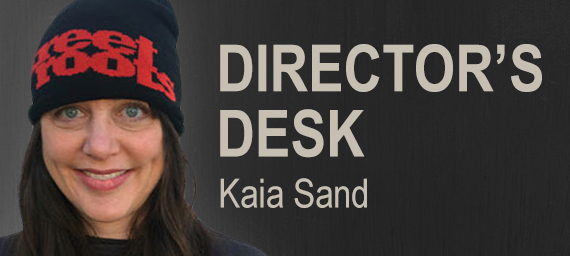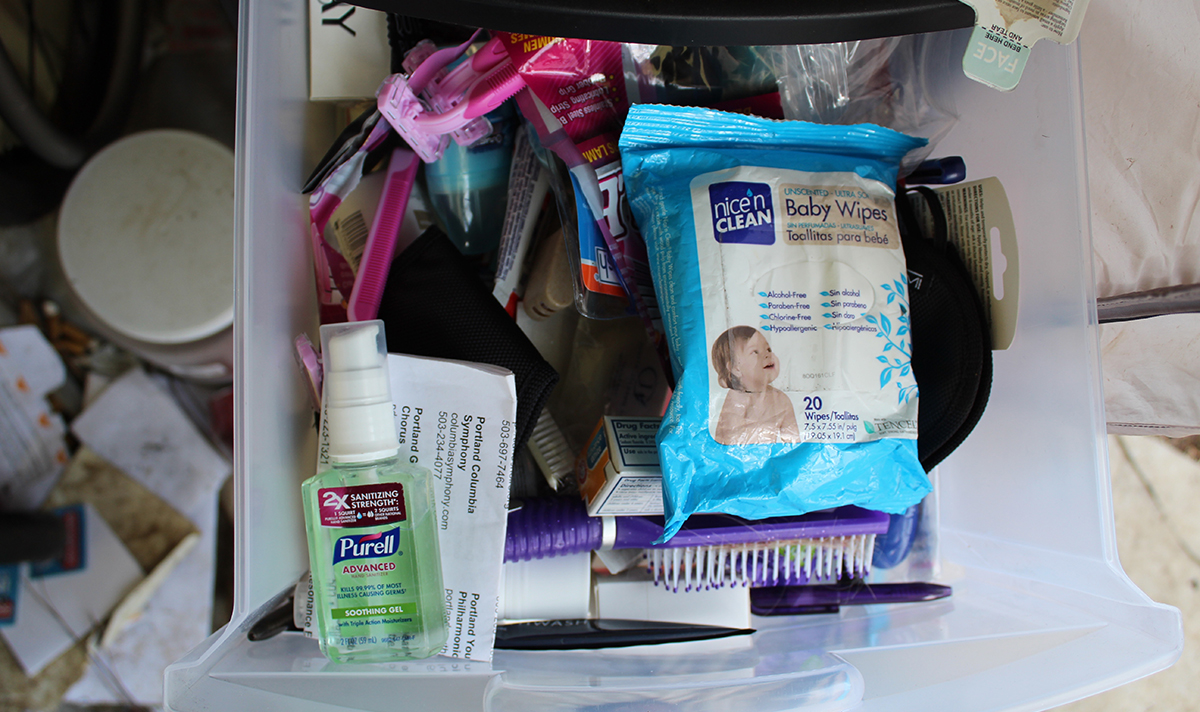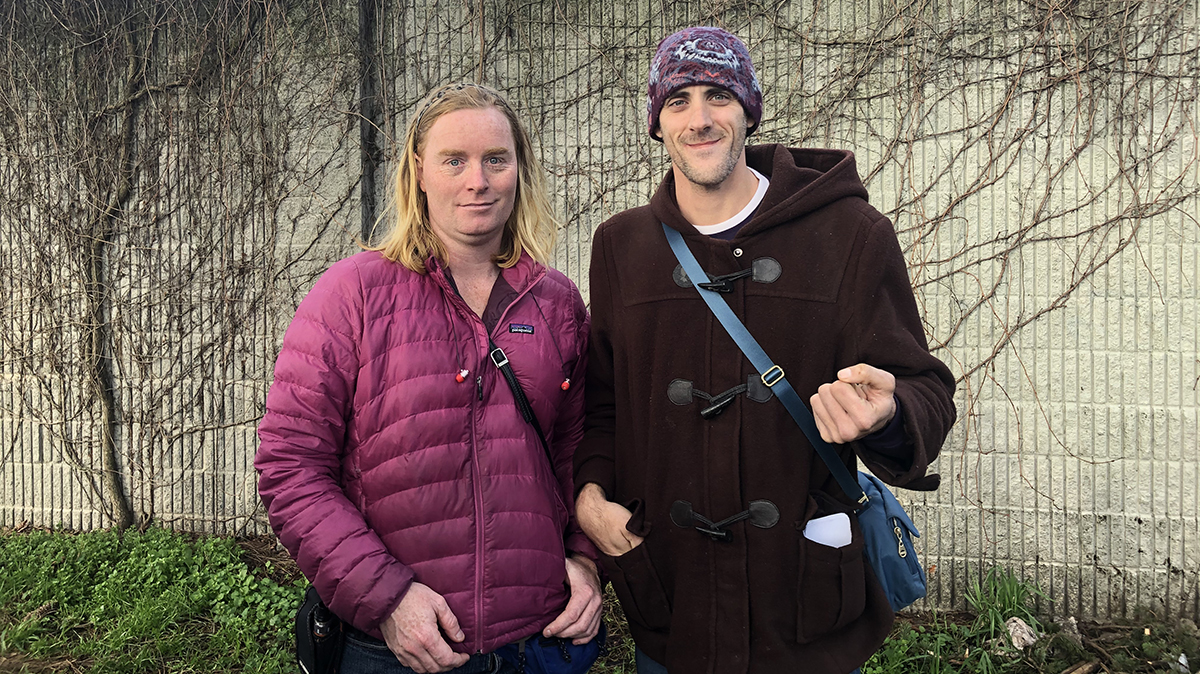We’re not helpless out here,” Raven Drake told me, standing in front of an eight-person tent that, she explained, would serve as a medical tent should any people in neighboring camps fall ill with coronavirus.
“There’s a lot of self-reliant people, and a lot of community-minded people who are willing to band together with the right resources and access to the right information. There’s a lot of us who are willing to do the job of keeping track of others and helping keep everyone safe and healthy,” she said.
“We’re just lacking the resources.”
Raven camps with two other Street Roots vendors, Tina Drake and Chris Drake, who have formed a family. Their small camp includes a two-person tent, a three-person tent and that eight-person tent that serves as kitchen and a medical tent stocked with medical supplies. It was that tent I was there to see.
I had learned about their medical tent the day prior. Raven is a former naval medic who served three tours in Iraq, so when we formed our small Street Roots coronavirus action team to coordinate with the Multnomah County Health Department and the Joint office of Homeless Services, adapting guidelines for our Street Roots community, I thought of her.
When we learned guidelines for keeping people 6 feet apart — the sick from the well — Raven explained she had an entire tent for that purpose, should anyone from a neighboring camp fall ill and need quarantine.
So she walked me past an open gate and a wall gripped by a vine with tight red buds. I felt a bit like I was walking along a secret English lane.
Then we turn out into a long strip of grass and ponderosa pines alit with robins and sparrows. Tarps pinned down with logs blocked the roaring freeway from view. Raven, Chris and Tina’s encampment is one of the many you might see looking up from your drive on the freeway. It’s a home disrupted by the roar of fast cars and discarded, coiled barbed wire loose on the ground, but it’s also filled with the coos of mourning doves. They do what they can, and they take care of each other.
LIFE ON THE STREETS: Street Roots vendors talk about how they cope with illness
When the Centers for Disease Control and Prevention emphasize that people stay home and wash their hands, it’s clear those guidelines don’t translate so easily to thousands of people in our region. (We’ve made our own posters at Street Roots.) The public health concerns in an epidemic stretch the routine concerns of everyday scarcity. The threat of epidemic is like a flickering fluorescent light, and it hurts to see so clearly the mess that already exists. It exacerbates shortages that have existed for decades, and amplifies the need for housing, health care and basic hygiene resources. Addressing one shortage, in this case, would address the other.
Gov. Kate Brown is estimating that the state will spend $7 million to $10 million a month should coronavirus spread as an epidemic in Oregon. Meanwhile, federal emergency money has been cut over the past several decades, according to The Washington Post. This week, Oregon received $500,000 in federal funds as a start. But this week also — absurdly, perversely — Republican legislators continued their walkout, denying a state of emergency around homelessness and millions of dollars to local communities. It’s all connected.
DIRECTOR'S DESK: Resourcefulness is essential for people on the streets, but so is a public investment
I asked Raven what she would ask for from the government, and she emphasized three things: “Good, reliable information, access to bathrooms and access to water.”
“It’s impossible to stay clean if you can’t get water,” she said. She described one elderly couple who collected rainwater and were trying to live off of that. Another camper now hauls in jugs of water for them.
It’s really all-hands-on-deck when it comes to hygiene support. We should open up recreation centers and park bathrooms. The city has trailers with bathrooms and sinks that could be mobilized. Anyone who is willing to have one parked should let the city know through its One Point of Contact line.
Our local government is already spread thin covering current services, so federal emergency funds must support outreach workers and hygiene services for people surviving this outbreak outdoors while purchasing any motels or single-room-occupancy buildings that can quickly be brought online. In this way, in fact, people can comply with the CDC guideline of staying home while sick.
In my dream scenario, Portland Street Medicine — a coalition of volunteer health care and social workers — would be fully funded. The Street Medicine teams take medicine out to people on the trails and in camps, making sure people have good information and supplies, building on relations they already have. All the outreach workers should be fully funded.
On-the-ground medical care is always urgently needed. Raven, whose sisters are both nurses, told me she is motivated to support her fellow unhoused Portlanders because she also knows that many feel stigmatized when accessing health care.
This stigma is something our community needs to steel itself against — the virulent racist and xenophobic scapegoating that’s already occurring has ramped up under the banner of this health crisis. We know that unhoused people are easily scapegoated, and so at Street Roots we call on all of you to stand together and demand that this not happen.
This I can assure you: At Street Roots, we are proactive. We will be on coordinating phone calls with the Joint Office of Homeless Services, staying as informed and ahead of the game as possible. We will keep reporting to you, calling out for what we need, and championing the resilience and smarts in the unhoused community.
The World Health Organization warns of global shortages of protective supplies because of consumer hoarding. It’s indicative of our culture, how surplus is hoarded and luxury protected while thousands of people are denied the most basic of goods. Tina and Raven continue to tote in jugs of water every couple of days, and for our office, we have crowd-sourced for hand sanitizer, or the alcohol and aloe vera gel we can use to make it, because we want to get them to people living unhoused.
We are watchful should this impact vendor sales — their livelihoods — if people venture into public spaces any less. With this in mind, please do lavish your vendor in any generosity you can. Watchful of this situation, we may launch an emergency fund to support vendors and we might call out to you for even more volunteer support. We’ll keep you posted.
Our whole community has a public health responsibility, especially for people for whom the resources always tilt so dramatically out of reach. Let’s be vigilant and proactive and loving.
Director's Desk is written by Kaia Sand, the executive director of Street Roots. You can reach her at kaia@streetroots.org. Follow her on Twitter @mkaiasand.




